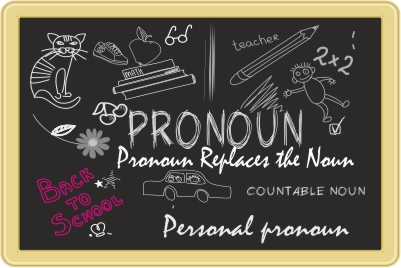
A pronoun is a word or phrase, which substitutes a noun or noun phrase. In other words, a pronoun is an automatic choice to replace a noun, which is already mentioned earlier. A pronoun can act in multiple roles. It can be used as a subject, direct object, indirect object, object of the preposition, and more. Practically, to avoid repetition of a noun, pronouns are used in place of a noun which is already mentioned or is already known.

Pronouns can be divided into numerous categories including: - Personal, Subjective, Objective, Possessive, Reflexive, Intensive, Relative, Indefinite, Interrogative, and Demonstrative.
Personal pronoun - Personal pronouns are used in place of nouns referring to specific people or things, for example, I,me,mine,your,yours, his, her, hers, we, they, or them. They can be divided into various different categories according to their role in a sentence. They are Subjective, Objective, Possessive and Reflexive pronouns.

The personal pronouns like I, you, we, he, she, it, and they are known as Subjective Pronouns, as they act as the subjects of verbs. Example – We all went to the Zoo to see the lions.
The personal pronouns like me, you, us, him, her, it, and them are called Objective Pronouns because they act as the objects of verbs and prepositions. Example – She smiled at me.
The personal pronouns like mine, yours, hers, his, ours, and theirs are known as Possessive Pronouns. These pronouns refer as to something owned by the speaker or by someone or something previously mentioned. For example: This pen is mine / Ours is a big family.
Reflexive personal pronouns include myself, himself, herself, itself, ourselves, yourselves and themselves. These pronouns are used to refer back to the subject of the clause in which they are used. Example - He fell and hurt himself.
Intensive pronoun – Intensive pronouns look alike Reflexive pronouns, but they add more emphasis. For example – ‘I composed the music’ and ;I composed the music myself’ mean almost the thing. But the word ‘myself’ emphasizes that I composed the music all by myself, I didn’t take help from anybody to do it.
Relative pronoun - Relative pronouns are used to connect relative clauses to the independent clauses. Often, they introduce additional information about something mentioned in the sentence. Relative pronouns include that, what, which, who, and whom. Traditionally, who refers to people, while which and that refers to animals or things. Example – His car, which is almost new, is stolen.
Indefinite pronoun - Indefinite pronouns are used when we need to refer to a person or thing that doesn’t need to be specifically identified. Some common indefinite pronouns are one, other, none, some, anybody, everybody, nobody and no one. Example – Nobody is bothered about the mishap.
Interrogative pronoun – Interrogative pronouns are used in questions. Who, what, which, and whose are included in this category. Examples – Who is there? Whose book is this?
Demonstrative pronoun – Demonstrative pronouns take the place of a noun or noun phrase that has already been mentioned earlier. They are used to point to something specific within a sentence. This, that, these and those are regarded as demonstrative pronouns. While ‘this’ is used for singular items that are nearby, ‘these’ is used for multiple items that are nearby. Similarly, ‘that’ is used for singular items that are far away and ‘those’ is used for multiple items that are far away. The distance can be physical or metaphorical. A classic example of demonstrative pronoun is –‘ Raindrops on roses and whiskers on kittens, bright copper kettles and warm woolen mittens, brown paper packages tied up with strings – these are a few of my favorite things.”